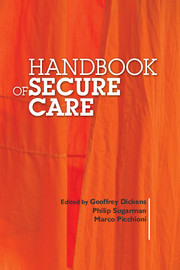Book contents
- Frontmatter
- Contents
- List of tables, boxes and figures
- List of contributors
- Preface
- 1 The evolution of secure and forensic mental healthcare
- 2 Mental disorder and offending
- 3 Clinical risk assessment in secure care
- 4 Risk management in secure care
- 5 Recovery in secure environments
- 6 Personality disorder
- 7 Women's mental health, aggression and offending
- 8 Offenders with intellectual disability in secure services and the criminal justice system
- 9 Secure mental healthcare for young people
- 10 Secure care for people with autism spectrum disorder
- 11 Acquired brain injury, trauma and aggression
- 12 Managing aggression and violence in older people
- 13 Firesetting in secure settings: theory, treatment and management
- 14 Specialist psychological treatment programmes in secure mental healthcare
- 15 Nursing in secure mental healthcare settings
- 16 Prescribing for specialist populations
- 17 Human rights in secure psychiatric care
- 18 Quality assurance and clinical audit in secure psychiatric care
- 19 Psychological support following violent assault and trauma: what works for staff in secure settings?
- Index
18 - Quality assurance and clinical audit in secure psychiatric care
Published online by Cambridge University Press: 02 January 2018
- Frontmatter
- Contents
- List of tables, boxes and figures
- List of contributors
- Preface
- 1 The evolution of secure and forensic mental healthcare
- 2 Mental disorder and offending
- 3 Clinical risk assessment in secure care
- 4 Risk management in secure care
- 5 Recovery in secure environments
- 6 Personality disorder
- 7 Women's mental health, aggression and offending
- 8 Offenders with intellectual disability in secure services and the criminal justice system
- 9 Secure mental healthcare for young people
- 10 Secure care for people with autism spectrum disorder
- 11 Acquired brain injury, trauma and aggression
- 12 Managing aggression and violence in older people
- 13 Firesetting in secure settings: theory, treatment and management
- 14 Specialist psychological treatment programmes in secure mental healthcare
- 15 Nursing in secure mental healthcare settings
- 16 Prescribing for specialist populations
- 17 Human rights in secure psychiatric care
- 18 Quality assurance and clinical audit in secure psychiatric care
- 19 Psychological support following violent assault and trauma: what works for staff in secure settings?
- Index
Summary
Introduction
In this chapter we will briefly describe clinical audit as an essential quality assurance tool within healthcare generally, with a focus on its potential application within secure psychiatric environments. Some practical tools and suggestions are provided.
Ensuring quality of service delivery is fundamental to the protection and effective treatment of patients. Despite this, academics and clinicians have struggled to agree how to define quality care. This may in part relate to the diversity of stakeholders; service users, commissioners, regulatory bodies and healthcare professionals all have a vested interest in the quality of services and yet can have very differing views on what is important and how this should be measured. Within secure services there are additional stakeholders to consider such as the Ministry of Justice, previous victims and the general public. Professor Lord Darzi defined high-quality care as care that is as ‘safe and effective as possible’ and ‘care [that] is personal to each individual’ (Department of Health, 2008); this definition was expanded by the National Quality Board (Department of Health, 2011a) to define three areas of quality as clinical effectiveness, safety and patient experience, emphasising that all three were equally important. Since the time of Florence Nightingale and the Crimean War, clinical audit has had a part in a modern health service, yet it was not until the 1989 White Paper, Working for Patients (Department of Health, 1989), that it rose to prominence. With the more recent development of the National Health Service (NHS) standard contract (Department of Health, 2011b) and the requirement for healthcare providers to substantiate the effectiveness of the care and treatment they provide, the focus for clinical audit has shifted to support the quality governance agenda. It is now essential that all healthcare organisations develop processes and systems to enable responsible managers and authorities to be assured that quality care is delivered; such systems encompass clinical or healthcare governance, one component of which is clinical audit.
- Type
- Chapter
- Information
- Handbook of Secure Care , pp. 287 - 307Publisher: Royal College of PsychiatristsPrint publication year: 2015



